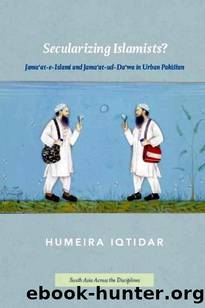Secularizing Islamists?: Jama'at-e-Islami and Jama'at-ud-Da'wa in Urban Pakistan (South Asia Across the Disciplines) by Humeira Iqtidar

Author:Humeira Iqtidar [Iqtidar, Humeira]
Language: eng
Format: epub
Published: 2011-08-16T22:00:00+00:00
Most speeches were interspersed with singing, or at least verses, and were delivered in a fiery style, in contrast to the relatively more reasoned style at JI. However, the overall theme remained a constant one: Muslims need to engage with the texts without any mediation and need to take responsibility for determining what constitutes a good Muslim life themselves. Another impassioned speaker challenged the audience: "[General] Musharaf says `Pakistan First,"' and we go along because we have no view of what comes first.... We can't even impose Islam in a five-marla house, we can't even it impose it on our four-feet-tall bodies, how can Musharaf impose Islam in Pakistan? What kind of Islam will he impose? How can we judge which is the right Islam?"
It is this emphasis on defining the right Islam, in contestation and competition with other versions of Islam, that lies at the very heart of the Islamist's efforts. The conversation ultimately is with otherMuslims and other visions of a "good Muslim life." The very similarity of Islamists in rejecting traditionalist claims of authority and in promoting a personal definition of a good Muslim life pits them into competition against each other. I turn to the basis and nature of competition among the Islamists now.
Overlapping Constituencies and Diverging Interests
Rapid urbanization in many Muslim societies, including those in Egypt, Iran, Turkey, and Pakistan '41 has provided a steady stream of activists and leaders to the Islamist parties in the twentieth and now the twenty-first century. While academic literature notes this trend, there has not been any significant exploration of how this affects the various Islamist groups that are trying to recruit these newly arrived urbanites to their respective groups. In the first four decades of its formation, the JI aimed to attract the mu'assir tabga-the educated and increasingly professional middle class. That it actually attracted mostly lower-middle-class new immigrants to the urban centers of Pakistan began to manifest itself in the leadership of the party during the 197os. However, the JI remained a largely select group of individuals until some time after Maududi's death. Following a period of upward mobility in Punjab, particularly from the 196os to the 198os, many of these JI members have indeed turned into middle-class professionals.44 At the same time, the populist inclinations of the JI leadership and activists since the 198os have seen it expanding its base in the lower-middle-class and some working-class constituencies. It is from within these constituencies that the JD is also trying to recruit.
The threat of competition was highlighted forme as I joined JI activists in their campaign in the inner city of Lahore just before union-level elections in 2005.4-1 The JI's reach in the inner city has been quite precarious historically, and, much to the dismay of local JI activists, JI top leadership had formed an alliance with its longtime rival, the "left-secular" Pakistan People's Party, for these elections. Many activists spoke of the blow to their credibility due to this move. One said, "If we had known these people (in the constituency) for a long time, we could have salvaged the situation somehow.
Download
This site does not store any files on its server. We only index and link to content provided by other sites. Please contact the content providers to delete copyright contents if any and email us, we'll remove relevant links or contents immediately.
The History of Jihad: From Muhammad to ISIS by Spencer Robert(2622)
Nine Parts of Desire by Geraldine Brooks(2361)
The Turkish Psychedelic Explosion by Daniel Spicer(2355)
The First Muslim The Story of Muhammad by Lesley Hazleton(2268)
The Essential Rumi by Coleman Barks(2043)
1453 by Roger Crowley(2023)
The Last Mughal by William Dalrymple(1855)
Trickster Travels: A Sixteenth-Century Muslim Between Worlds by Davis Natalie Zemon(1847)
Muhammad: His Life Based on the Earliest Sources by Martin Lings(1644)
God by Aslan Reza(1639)
by Christianity & Islam(1629)
A Concise History of Sunnis and Shi'is by John McHugo(1567)
No God But God by Reza Aslan(1540)
Magic and Divination in Early Islam by Emilie Savage-Smith;(1533)
The Flight of the Intellectuals by Berman Paul(1502)
Nothing to Envy by Barbara Demick(1445)
Art of Betrayal by Gordon Corera(1429)
What the Qur'an Meant by Garry Wills(1391)
Getting Jesus Right: How Muslims Get Jesus and Islam Wrong by James A Beverley & Craig A Evans(1340)
